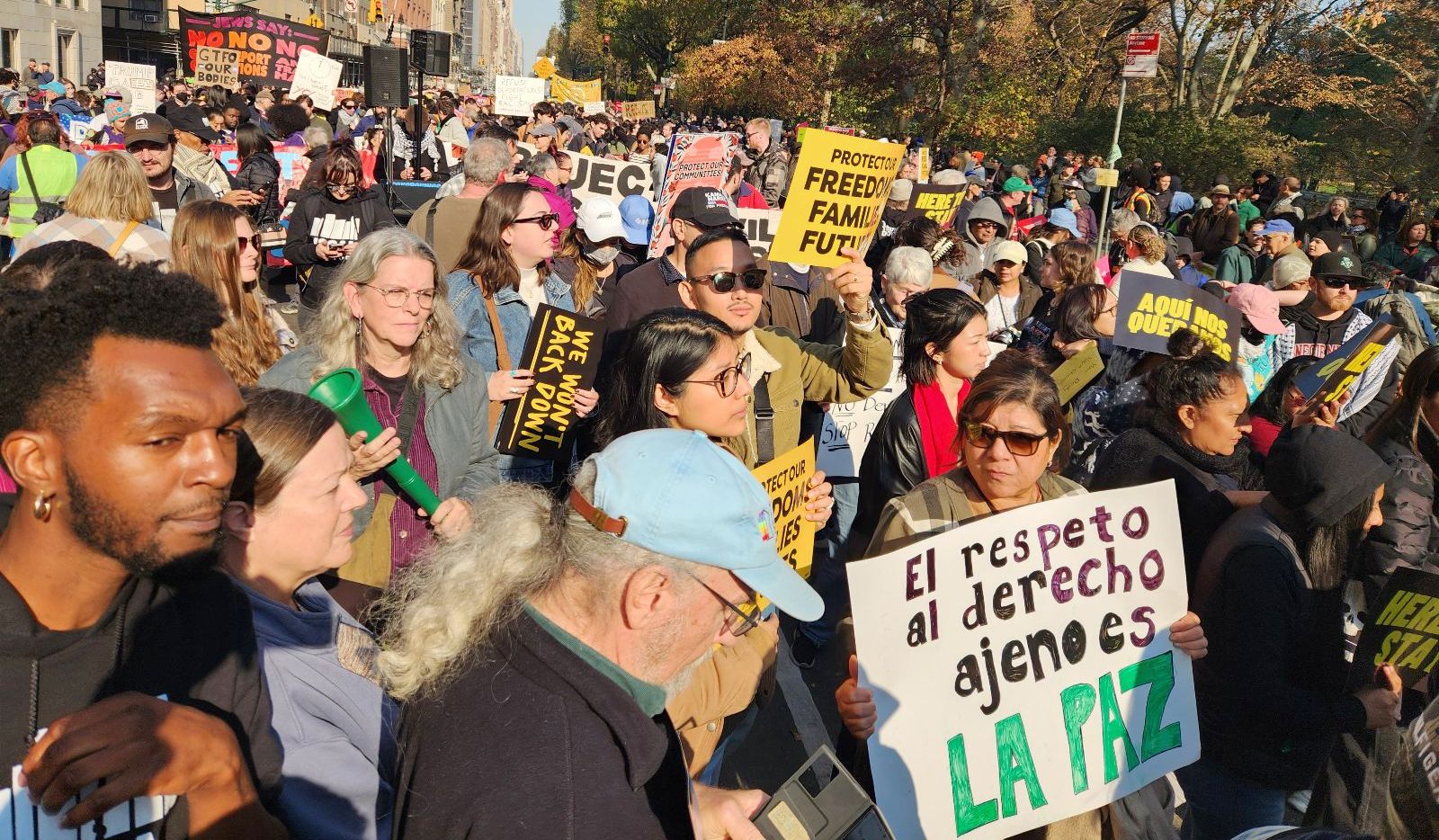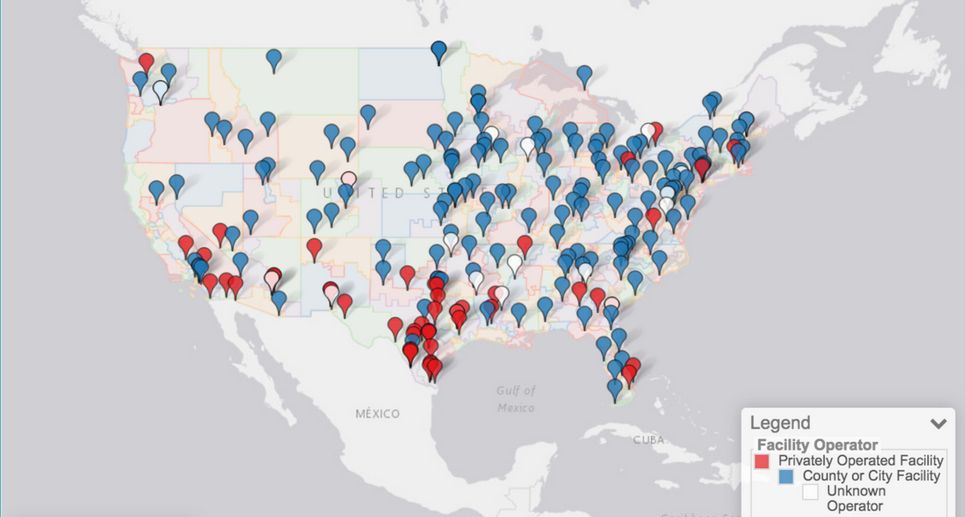Thursday, November 14, 2024
United States
Broad Opposition to Trump Plan to Use Eisenhower Model and Alien Enemies Act

March opposing Trump's agenda in New York City November 9, 2024
• Broad Opposition to Trump Plan to Use Eisenhower Model
and Alien Enemies Act
• Huge Public Costs for Criminal Mass
Deportations While
Private Prison Companies Benefit
United States
Broad Opposition to Trump Plan to Use
Eisenhower Model and Alien Enemies Act

Banner at New York City march, November 9, 2024
I believe that democracy has so far disappeared in the
United States that no "two evils" exist. There is but one evil
party with two names, and it will be elected despite all I can
do or say. - W.E.B. Dubois, 1956[1]
Donald Trump has repeatedly said he would use the Eisenhower Model when it comes to deporting millions of people and the Alien Enemies Act when it comes to targeting whoever is deemed to be the "enemy within." The peoples and their organizations will be the focus of these attacks and they are already organizing to resist and defeat these plans.
It is important to look closely at both the Eisenhower Model and the Alien Enemies Act as both are connected with specifically targeting people of Mexican origin, whether citizens, immigrants, documented or undocumented people. They are also specifically linked to increased use of detention camps and the military, and the imposition of federal authority. These are all part of increasing presidential police powers, necessary for preserving the Union and presidential dictate at home and abroad.
The Eisenhower Model, implemented in 1954, involved deportation of what is officially estimated to be about 300,000 people of Mexican origin, many of them citizens, though Eisenhower (34th U.S. president 1953-1961) claimed it was more than a million. The campaign was designed by a retired United States Army lieutenant general who was head of what was then the U.S. Immigration and Naturalization Service (INS). It utilized "military-style" tactics in targeting workers and communities along with the promotion of racist slurs, criminalization of workers and efforts to divide people. It was part of the post-World War II efforts by the U.S. to undermine the anti-fascist spirit and international unity that had developed during the war and impose anti-communist loyalty oaths and anti-worker, racist laws.
The history.com website writes that during Eisenhower's campaign, "tens of thousands of immigrants were shoved into buses, boats and planes and sent to often-unfamiliar parts of Mexico, where they struggled to rebuild their lives. In Chicago, three planes a week were filled with immigrants and flown to Mexico. In Texas, 25 per cent of all of the immigrants deported were crammed onto boats later compared to slave ships, while others died of sunstroke, disease and other causes while in custody."
It was also not the first time such raids against people of Mexican origin took place. The U.S. deported more than 1 million Mexican nationals, 60 per cent of them U.S. citizens, during the depression in the 1930s "in a program referred to as repatriation to give it the sense of being voluntary." This too was designed to disrupt the many mass struggles taking place among workers, where these workers played a militant and significant role, as they do today.
Besides the aim of depriving so many people of health care benefits, public resources for their families and work-related pensions, a main reason Mexican Americans are being targeted is precisely because they are in the forefront of many battles for rights. Their revolutionary traditions became evident in recent years in organizing to restore May Day demonstrations which focus on rights, not only in California but elsewhere. Trump is not only targeting undocumented workers but providing means to increase repression and disrupt united actions of all workers and all those standing to defend rights.
Using the Alien Enemies Act Against the People
The Alien Enemies Act specifically allows the president to detain, relocate, or deport, during war-time, non-citizens from a country considered an enemy of the U.S. It was first used in the War of 1812 against the British, which also involved Canada, and in World War I against Germans.
It was amended in 1918 to include women and subsequently used in World War II, mainly against Germans, Italians and Japanese. Thousands were forced to register and were detained, including after the two wars ended.
The Alien Enemies Act stipulates:
"Whenever there shall be a declared war between the United States and any foreign nation or government [...] and the President of the United States shall make public proclamation of the event, all natives, citizens, denizens, or subjects of the hostile nation or government, being males of the age of fourteen years and upwards, who shall be within the United States, and not actually naturalized, shall be liable to be apprehended, restrained, secured and removed, as alien enemies."
While various experts are saying the Act cannot be used because there is no declared war, they ignore that all the wars since WWII have been declared by the president, not Congress and that the U.S.-led "war on terror" launched after 9/11 has been used to claim that this is wartime and involves all countries of the world. As well, the last time the Alien Enemies Act was challenged, in Ludecke v. Watkins in 1948, the Supreme Court upheld President Harry S. Truman's extended reliance on the law three years after the end of World War II. The Court said that the question of when a war terminates, and wartime authorities expire, is too "political" for courts to decide.
The presidential powers concerning wars and utilizing wartime authorities, such as those establishing Guantánamo, defining "enemy combatants," authorizing torture, "kill lists," legitimizing black ops and more are far greater now than in 1948. And as the case of the Guantánamo prison camp has shown, the president can simply ignore Supreme Court rulings, as Obama and those since him have done. A Migrant Detention Center housing Haitians and others including women and children, has already been established at the Guantánamo naval base alongside the prison camp. Since it is not U.S. territory, this Detention Camp also does not fall within the purview of U.S. laws.
The Alien Enemies Act was part of four laws passed known as the Alien and Sedition Acts. The Sedition Act made it a crime for U.S. citizens to "print, utter, or publish [...] any false, scandalous, and malicious writing" about the government. Trials were conducted against journalist and government officials and others. While it is no longer law, given current conditions where the presidency needs to repress the growing resistance and justify attacks on "enemies within," be they journalists, government officials, district attorneys, and so forth, Trump could well use the Alien Enemies Act for similar purposes.
The period when the Act was passed was also a period of uprising and struggles. This included those stemming from the revolutionary spirit among the people for independence and rights that required the ruling elite of the day to include the Bill of Rights in the Constitution (1787). In the U.S. and internationally, many struggles of the workers were also taking place at that time, as well as the Haitian revolution and Irish uprising for freedom from British rule.
The Bill of Rights speaks to freedom of religion, press, speech, association and petitioning the government. It is to disrupt the resistance movements today and brand them and those who participate in them as "foreign" or "alien," to be brutally crushed, that the Alien Enemies Act is again being invoked.
Broad resistance is already being organized to block deportations and defend the many protesters already in action for Palestine, in support of immigrants, migrants and refugees, and all those standing for rights.

New York City, November 9, 2024
Note
1. "Why I Won't Vote," by W.E.B.Dubois, The Nation, October 20, 1956
On October 20, 1956, W. E. B. DuBois delivered an eloquent indictment of U.S. politics while explaining to Nation readers why he would not be voting in the upcoming Presidential election. DuBois condemned both Democrats and Republicans for their indifferent positions on the influence of corporate wealth, racial inequality, arms proliferation and unaffordable health care.
For the full text, click here.
(Voice of Revolution, U.S. Marxist-Leninsit Organization)
Huge Public Costs for Criminal Mass Deportations While Private Prison Companies Benefit
Organizations across the United States are expressing their outrage at the human cost of mass deportations, for the individuals, families and communities involved, and the massive public funds required. The private prison companies are crowing about their "unprecedented opportunity" to grab up guaranteed government funding to build and manage the big increased need for detention camps.
The two main private prison corporations, GEO Group and CoreCivic, are already benefiting from government plans for mass deportation of an estimated 13 million people. The process for many of the workers facing possible deportation will be first detention and then deportation. It is also likely many will be indefinitely detained and held for use as enslaved labour, in the detention camps, in agriculture, various state-related work like laundry, license plates, etc. – much like the enslaved labour of prisoners.
Many of these camps are already run by the two private companies. With Trump's election, GEO Group's stock surged more than 56 per cent from the close of trading on Election Day, to the closing bell on Friday, November 8. CoreCivic's shares skyrocketed 57 per cent over the same period. By contrast, in the three months preceding Election Day, GEO Group stock saw a 21 per cent rise. CoreCivic stock rose 11 per cent over the same period.
The federal government works with county jails and contracts with the private sector, mainly these two companies, to build, operate and manage the majority of detention facilities. Only a small number of detention beds are in federally owned facilities.
Currently Immigration and Customs Enforcement (ICE) detains more than 36,600 people in a network of more than 200 immigration detention camps across the country. This year, Biden signed a federal spending bill that increases funding for ICE to maintain an average daily population of 41,500 people in detention which provides the highest level of funding for custody and surveillance operations in ICE's history. Clearly, when talking about detaining and deporting millions of people, these detention facilities must greatly expand. There is also talk about using currently empty military bases as well as expanding the existing Guantánamo detention camp.

Map of current immigration detention centres and public/private ownership.
It has been well-documented, including by Congressional investigations, that conditions in the existing camps are more like concentration camps. There are widespread abuses from torture and medical neglect, including deaths, forced sterilization and rape, sexual assault of children, malnourishment and more.
The total cost for even one million deportations will be staggering. According to ICE, in 2016, the average cost of apprehending, detaining, processing and removing one undocumented immigrant from the United States was $10,900. Given inflation and costs for expanding the detention camps, staffing them, increased ICE staffing and more, it is estimated that removal of one million people each year for 10 years would cost about $1 trillion.
Such criminal attacks on workers and their families, and criminal use of public funds, are widely denounced with many raising the demand to close all detention camps, stop funding war and detention and fund the rights of the peoples!
(To access articles individually click on the black headline.)
Website: www.cpcml.ca • Email: editor@cpcml.ca

